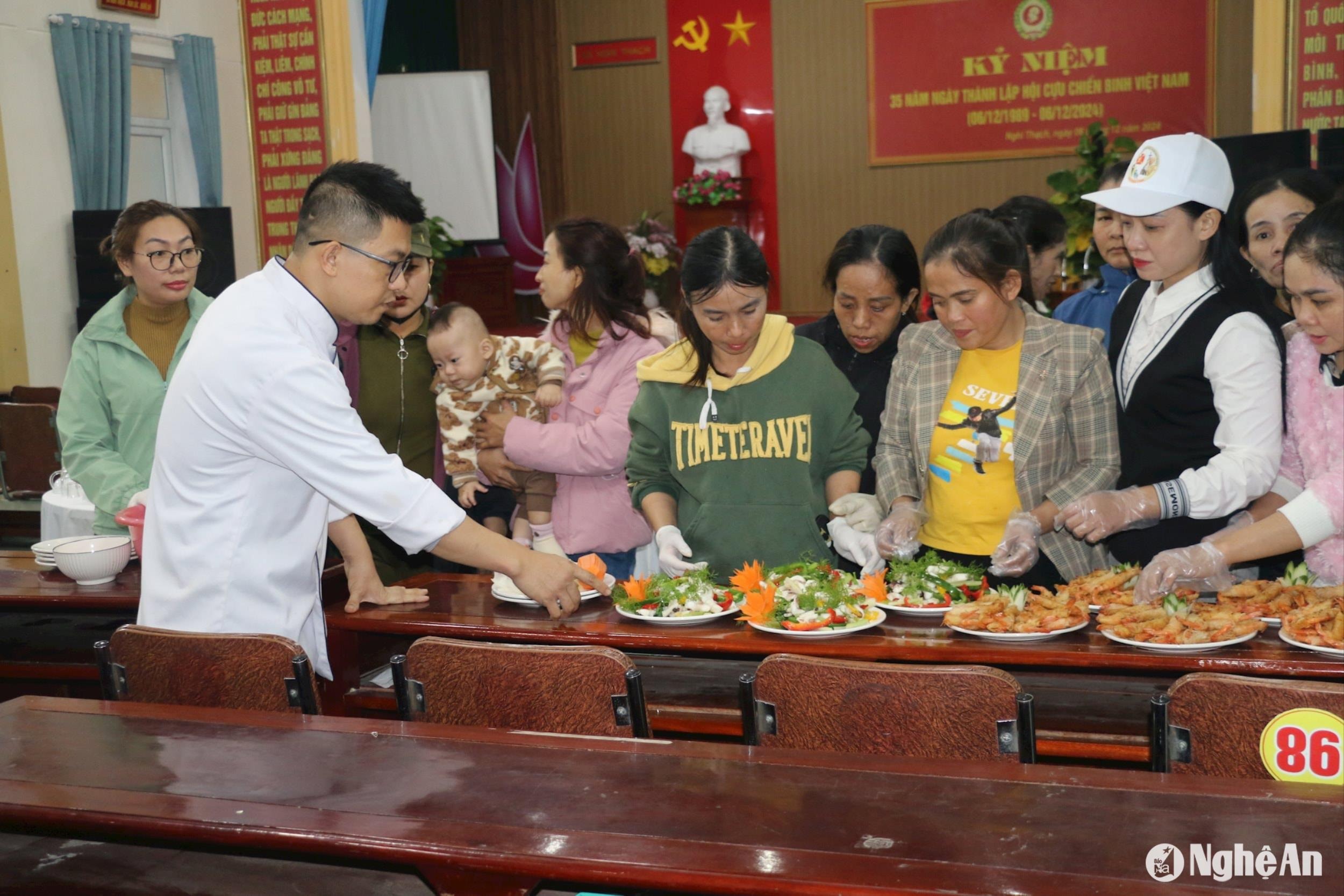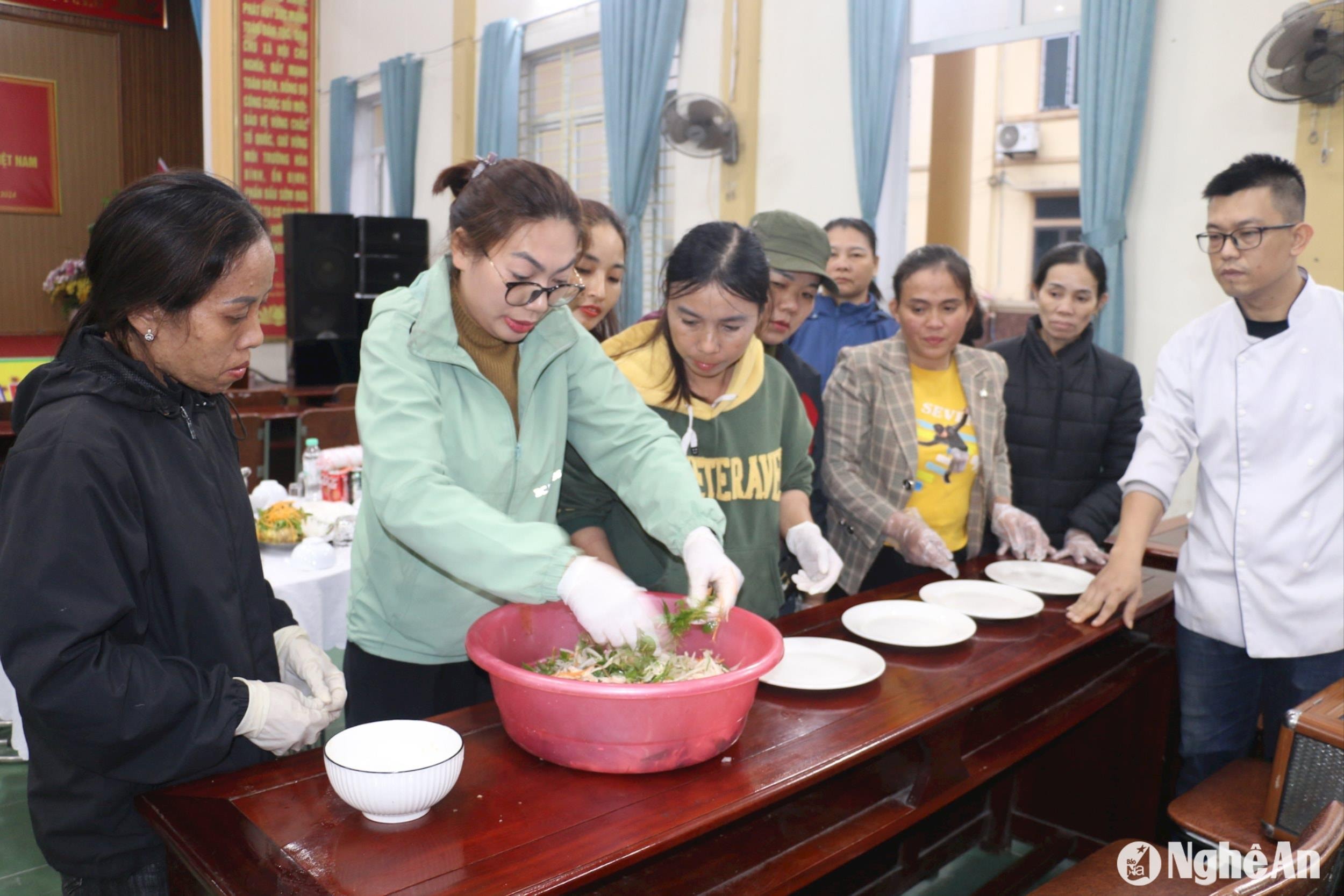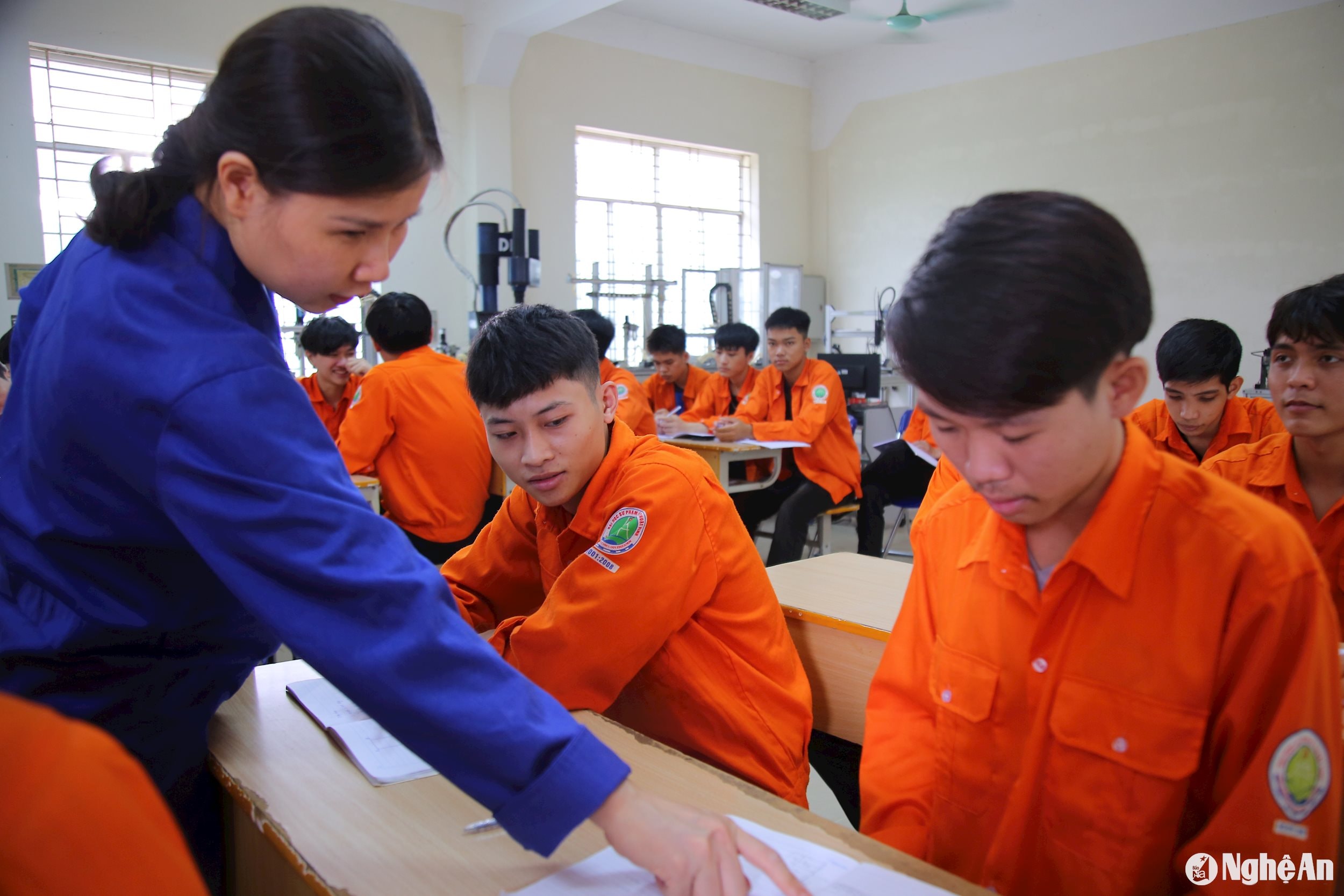Concerns about primary vocational training for rural workers in Nghe An
Vocational training for rural workers has been carried out for many years and has achieved certain results. However, attracting rural workers to vocational training is facing difficulties. The reason is that they are afraid of changing careers and are concerned about the level of skills they can achieve after only 3 months of training.
Difficult to attract students

The Culinary Arts class was conducted by Nghi Loc district in collaboration with Hong Lam College of Economics and Technology from October 2024 to December 15, 2024, with 35 students. However, many students dropped out of school due to their daily work, and by the closing day, there were only 30 students left.
Participating in this class, Ms. Phung Thi Hoa, Nghi Thach commune, said: "Up to now, I have only done seasonal jobs for income during the day such as buying and selling scrap metal, cleaning houses... When the commune encouraged me to learn the culinary arts, I immediately agreed and hoped that after studying, I would have the skills to join cooking teams in the commune or be able to work as an assistant in the kitchen to cook common dishes for restaurants and hotels." After the course, her skills were greatly improved, from a few common dishes now she can cook 30 Vietnamese dishes with new techniques.

Unlike Ms. Hoa, Ms. Truong Thi Thanh in Hamlet 8, Nghi Thach Commune is also a near-poor household in the commune that was attracted to the Culinary Arts class. However, Ms. Thanh does not want to change her career as the commune government has directed, because she is already skilled in spa services at a beauty salon in the area.
Ms. Thanh shared: "I went to study Culinary Arts to satisfy my passion and hope to have the opportunity to show off my skills to my family during the holidays. I also get financial support when I go to culinary school, so we are very happy to participate in this class."
Ms. Pham Thi Nga - policy officer of Nghi Thach commune said: Every year, to attract members of poor and near-poor households to participate in elementary vocational training classes organized by the district in coordination with the Vocational School, policy officers of communes have to work very hard to mobilize. The reason is that members of poor households do not want to participate in vocational training classes.
According to Ms. Nguyen Thi Loc - Department of Labor, Invalids and Social Affairs of Nghi Loc district: Many years ago, vocational training for rural workers at the elementary level for poor and near-poor households attracted a lot of students because of the mentality of only studying for a short time, but having a job in hand. Besides, workers who go to school are also supported with 30,000 VND/person/day, after 3 months some people even received nearly 3 million VND, so everyone is very excited.
However, the number of workers has decreased over time. We even had to go to each household and meet each person to promote and mobilize them, but we still could not attract students for vocational classes such as veterinary medicine, citrus growing, animal husbandry, etc. In 2023, the whole district had 11 classes including food processing techniques, industrial sewing, and citrus growing. However, in 2024, there were only 8 classes, mainly food processing techniques. Every commune that received the task said it was very difficult to attract workers to register for vocational training.

In charge of elementary vocational training classes for local workers, teacher Phan Xuan Dung - Principal of Hong Lam Technical and Vocational College said: For many years, we have been implementing training contracts for districts such as Nghi Loc, Tan Ky, Con Cuong, Hoang Mai town, with occupations such as citrus growing, food processing techniques, and industrial sewing. During the vocational training, students are very excited to change careers, especially for Food Processing Techniques and Industrial Sewing, but after studying, many people still do not have the basis to change careers.

The difficulty in attracting poor and near-poor rural workers to attend vocational training classes is common in districts, cities and towns, especially in mountainous districts.
Mr. Le Anh Tuan - Principal of Nghe An Ethnic Minority Vocational College said: Many years ago, we signed contracts with districts in the Western part of Nghe An, focusing on Con Cuong and Anh Son districts to train in occupations such as mushroom growing, beekeeping, pig, goat and chicken farming, fashion sewing, and brocade weaving. In 2024, the school will also train 620 people, but for students to change careers, only those who study sewing will have high feasibility.
Find a solution
Ms. Ho Thi Chau Loan - Deputy Director of the Department of Labor, Invalids and Social Affairs said: In 2024, the whole province will train 52,350 people in the Primary level and under 3-month training, reaching 103% of the plan (down 1.7% compared to the same period in 2023). Vocational training funds are used from the Central budget according to the National Target Program on Poverty Reduction. In particular, the main training is for workers participating in production in the agricultural production planning area focusing on local key products.
The reason why it is increasingly difficult to attract workers to participate in elementary and short-term vocational training classes despite the large amount of capital allocated for this category is because the propaganda work is still not regular, especially in ethnic minority areas, leading to some subjects not being able to access vocational training support policies. In addition, workers have the habit of working part-time during the day and receiving money immediately, so they are not interested in vocational training.
Another reason is that it is very difficult for workers to change careers after training. According to delegates at the 2024 Labor Work Summary Meeting, the training time for vocational classes is about 3 months, so students only have a basic understanding of how to use tools and basic knowledge; skills are not enough to apply for a job or create their own job. In particular, the State currently only supports students from poor and near-poor households, while rural workers are not supported, so it is very difficult to motivate them to learn a trade.
Mr. Hoang Sy Tuyen - Head of Vocational Training Department of the Department of Labor, Invalids and Social Affairs said: Currently, although the capital support for primary vocational training is large, especially for the target group under Sub-project 3, Project 5 of the National Target Program for ethnic minorities. However, attracting workers from poor and near-poor households is very difficult. The reason is that the number of workers from poor households is decreasing, and vulnerable beneficiaries cannot participate in vocational training.
Furthermore, the mechanisms and policies related to vocational training for rural workers in the province are not timely, leading to confusion in the direction, management and implementation of plans at the local level.
In addition, the local labor force is currently mainly elderly, the number of young and middle-aged laborers staying in the locality is very small. Information, propaganda, and vocational training counseling for rural laborers in the localities is not effective. In particular, the connection with businesses to create jobs for students after training is still limited.
To achieve the rate of trained workers by the end of 2025 reaching 71.5%; of which, 31% have diplomas and certificates, in 2025, the province will innovate, improve training quality, improve vocational skills and the effectiveness of agricultural vocational training for rural workers, contributing to the transformation of labor structure, economic structure, job creation, and increasing income for workers. In particular, focusing on vocational training to implement national target programs.
At the same time, train workers to know how to increase the value of key products, develop OCOP products, products with strong regional national identity. For non-agricultural sectors, it is necessary to link output with local businesses such as the Garment industry, Food Processing Technology...
To increase the attraction of rural workers to participate in vocational training, the representative of Tuong Duong district in the 2024 Labor Work Summary session recommended: The province needs to promptly add new occupations and specific occupations that attract many rural and mountainous workers and meet the requirements of regional economic development such as agricultural service occupations, agricultural business, other non-agricultural occupation codes suitable to market needs...


